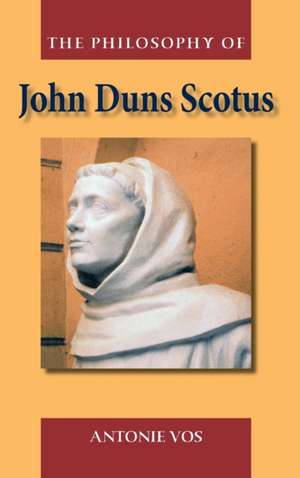The Philosophy of John Duns Scotus
Autor Antoine Vosen Limba Engleză Hardback – 10 oct 2006 – vârsta de la 22 ani
This book provides a comprehensive overview of the life and works of John Duns Scotus, arguably one of the most significant philosopher-theologians of the Middle Ages. Examined are his immense contributions to the fields of logic, metaphysics, philosophy of mind and action, and ethical theory.
Preț: 1374.65 lei
Preț vechi: 1593.70 lei
-14% Nou
Puncte Express: 2062
Preț estimativ în valută:
263.16€ • 270.64$ • 218.32£
263.16€ • 270.64$ • 218.32£
Carte tipărită la comandă
Livrare economică 19 februarie-05 martie
Preluare comenzi: 021 569.72.76
Specificații
ISBN-13: 9780748624621
ISBN-10: 0748624627
Pagini: 654
Dimensiuni: 164 x 236 x 56 mm
Greutate: 1.16 kg
Editura: EDINBURGH UNIVERSITY PRESS
ISBN-10: 0748624627
Pagini: 654
Dimensiuni: 164 x 236 x 56 mm
Greutate: 1.16 kg
Editura: EDINBURGH UNIVERSITY PRESS
Notă biografică
Antonie Vos is Lecturer in Systematic Theology, Church History and Medieval Thought for the Netherlands Reformed Church, at the University of Utrecht. He is editor of Duns Scotus on Divine Love: Texts and Commentary on Goodness and Freedom, God and Humans (Ashgate, 2003) and Contingency and Freedom: John Duns Scotus Lectura 139 (Kluwer Academic Publishers, 1994).
Cuprins
INDEX; FOREWORD; INTRODUCTION; 1. Introduction; 2. Philosophy versus theology; 3. The duality of a history of what is a-historical; 4. Later medieval versus early modern centuries; 5. The topicality of philosophical legacies; 6. Overview; I; LIFE I. DUNS AND OXFORD; 1.1 Introduction; 1.2 A Scottish boy; 1.3 Student of divinity at Oxford; 1.4 A senior theological student; 1.5 Bachelor of divinity; 1.6 Lectura I-II; 1.7 Baccalaureus biblicus and baccalaureus formatus; 1.8 Oxford and Paris; II; LIFE II.; PARIS, OXFORD, CAMBRIDGE, AND COLOGNE; 2.1 Introduction; 2.2 At Paris I: 1301-1303; 2.3 Oxford: again at home and baccalaureus sententiarius at Cambridge; 2.4 At Paris II: baccalaureus 1304-1306; 2.5 At last: magister at Paris; 2.6 A problem historical interlude; 2.7 Professor at Paris (1306-1307) and Cologne (1307-1308); 2.8 Epilogue; III; TWO CRITICAL TEXT REVOLUTIONS; 3.1 The fate of an oeuvre; 3.2 From the history of Duns Scotus' oeuvre; 3.3 The first revolution in textual criticism: the spurious works; 3.4 The second revolution in textual criticism during the 1920s; 3.5 Tragedy and perspective; 3.6 The authentic works; 3.7 The moral; IV; LOGIC MATTERS; 4.1 Introduction; 4.2 The significance of John Duns' logical writings; 4.3 The subject-matter of logic; 4.4 Meaning; 4.5 The problem of meaning and the problem of knowledge; 4.6 Concept; 4.7 Proposition; 4.8 Negation; 4.9 Truth; 4.10 Logical impossibility and logical possibility; 4.11 Elements of the theory of relation; 4.12 The impact of John Duns' early development; V; ARS OBLIGATORIA; 5.1 Introduction; 5.2 The identity of the textbook on the ars obligatoria referred to by Duns; 5.3 The identity of the magister artis obligatoriae in Lectura I 39,59; 5.4 Sherwood's Obligationes and Duns' Lectura; 5.5 Impossibilis positio; 5.6 Consequentia naturalis and consequentia innaturalis; 5.7 Perspective; VI; CONCEPTUAL DEVICES; 6.1 Introduction; 6.2 In sensu composito and in sensu diviso; 6.3 Ante and post; 6.4 The nature of 'nature': prioritas naturâ (structural priority); 6.5 Instantia (structural moments); 6.6 Real and rational relations and identity; 6.7 The formal distinction; 6.8 A little epilogue; VII; ONTOLOGY; 7.1 Introduction; 7.2 The subject-matter of ontology; 7.3 The ontology of contingency; 7.4 The neutral proposition; 7.5 Essence and existence; 7.6 Real and rationa relations; 7.7 Universals; 7.8 Conceptual univocity; 7.9 Transcendent terms; VIII; EPISTEMOLOGY; 8.1 Introduction; 8.2 Methodological parsimony: the razor Scoti; 8.3 The theoretical background of Lectura I 3,172-181; 8.4 Deductive knowledge; 8.5 Experiential and inductive knowledge; 8.6 Knowledge of personal acts; 8.7 Intuitive knowledge; 8.8 Memory; 8.9 The perspective of an epistemological revolution; IX; ARGUMENT, PROOF AND SCIENCE; 9.1 Introduction; 9.2 Kinds of arguments; 9.4 Theory of science; 9.5 The dilemma of provability; 9.6 Gilson on Duns Scotus' theory of proof; 9.7 Conclusion; X; PHYSICS; 10.1 Introduction; 10.2 Matter; 10.3 Unity; 10.4 The plurality of forms; 10.5 Accidents; 10.6 Astronomical themes; 10.7 Theology and the scientific revolution; XI; INDIVIDUALITY, INDIVIDUALS, WILL AND FREEDOM; 11.1 Introduction; 11.2 The matter theory of individuality; 11.3 A nominalist theory of individuality; 11.4 Individuality; 11.5 Will; 11.6 Paris versus Oxford?; 11.7 Freewill and freedom; 11.8 Perspective; XII; ETHICAL STRUCTURES AND ISSUES; 12.1 Introduction; 12.2 Duns' ethical paradox; 12.3 Scotian ethical language; 12.4 Ethical structures; 12.5 Love of God and love of neighbor; 12.6 Slavery; 12.7 The Quintonian and Harrisian fallacies; 12.8 Ethical revocation; 12.9 The structure of the ethics of virtue; 12.10 The unity of virtue; 12.11 Perspective; XIII; THE PHILOSOPHICAL THEORY OF GOD; 13.1 Introduction; 13.2 The existence of God; 13.3 God's knowledge; 13.4 The contingent nature of God's immutable and perfect knowledge; 13.5 God's will; 13.6 Perspective; XIV; JOHN DUNS, ARISTOTLE AND PHILOSOPHY; 14.1 Introduction; 14.2 The 'philosophers' and philosophy; 14.3 Henry of Ghent/Duns Scotus versus Aristotle/Avicenna; 14.4 Lectura I 8: the 'philosophical' way of ideas; 14.5 Theologia against the philosophers; 14.6 Proof theoretical comments; 14.7 'Theology' and 'philosophy'; 14.8 An auctoritates culture; 14.9 The perspective of a dilemma; XV; IDEA HISTORICAL DILEMMAS CONCERNING DUNS SCOTUS' THOUGHT; 15.1 Introduction; 15.2 The dilemma of modern studies in the history of medieval philosophy; 15.3 The rebound of the 'historiens croyants'; 15.4 Étienne Henri Gilson (1884-1978); 15.5 Lambertus Marie de Rijk (* 1924); 15.6 On the paradox of Western philosophy; XVI; PHILOSOPHY IN A NEW KEY - EXTRAPOLATIONS AND PERSPECTIVES; 16.1 Introduction; 16.2 The dilemma of the history of medieval philosophy; 16.3 Some characteristics of Duns Scotus' oeuvre; 16.4 The philosophical dilemma of two philosophies: immutability in a new key; 16.5 The depth structure of Duns Scotus' way of thinking; 16.6 Logic and semantics; 16.7 Knowledge and proof; 16.8 The ontology of reality; 16.9 An ethics of dignity and love; 16.10 God; 16.11 A perspective: philosophia christiana; ABBREVIATIONS; Reference devices; BIBLIOGRAPHY; OPERA OMNIA; CRITICAL EDITIONS; BIBLIOGRAPHIES; STUDIA SCOTISTICA; LATIN; BIBLIOGRAPHY.
